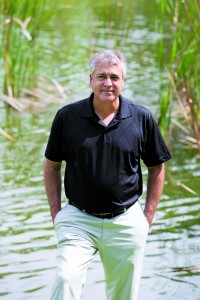NSU Newsroom
SharkBytes
Horizons
This version of NSU News has been archived as of February 28, 2019. To search through archived articles, visit nova.edu/search. To access the new version of NSU News, visit news.nova.edu.
This version of SharkBytes has been archived as of February 28, 2019. To search through archived articles, visit nova.edu/search. To access the new version of SharkBytes, visit sharkbytes.nova.edu.
Expanding 836 Highway Would be a Big — and Destructive — Step Backward
GUEST EDITORIAL / OP-ED
Expanding 836 Highway Would be a Big — and Destructive — Step Backward
Miami-Dade Mayor Carlos Gimenez’s desire to alleviate traffic congestion in West Kendall is understandable. His attack on those raising concerns is not. The opposition to the extension of the 836 highway outside of the county’s urban boundary is based, not on “misinformation,” but serious concern, based on history and the realities of development practices and economics, that the county would be making a huge mistake.
Addressing traffic problems in the 21st century with a 1970s solution of building more highways is a bad investment given what we now know about how quickly new roads fill up with new traffic and open areas to new development, and about the critical need to shift away from infrastructure for cars and toward real mass transit. Miami-Dade County’s land use plan specifically reflects these understandings and, for these reasons and others, contains explicit prohibitions against building new public infrastructure — like this highway extension — beyond the Urban Development Boundary.
The looming decision of whether to invest $650 million into another highway expansion or modern mass transit comes at a pivotal point in this county’s history, as it is coming to terms with the necessity of re-working its water supply and flood-protection system, reducing its vulnerability to climate change and sea level rise, and restoring the Everglades upon which it relies for so many economic, recreational and other purposes. It is concerning that some in county leadership may not understand that building a highway through the Bird Drive Basin wetlands would compromise the restoration project water managers are still designing for those lands to prevent flooding and restore previously impacted wetlands in western Miami-Dade County.
The PR campaign to promote this highway may be selling fool’s gold to West Kendall residents, and the county would soon be looking for yet another new road in a few years when this one fills up with new traffic — whether or not it leads to new development in the area.
But it will, further compromising the touted traffic-relief benefits.
The proposed new policy language the Mayor and others rely upon to prevent the highway from supporting new development would likely be as permanent and effective as the highway’s proponents are treating the current county land use plan policies, which prohibit this highway in this location. The reality of a new $650 million highway will overwhelm any policy language in the land use plan that tells County planners to ignore that it exists near land on which developers want to build. These new policies will almost surely be deleted or ignored at that point, and those seeking in vain to enforce them likely criticized as outsiders who are “against” affordable housing.
Modern planning, and the county’s land-use plan, call for directing new development to infill and redevelopment locations, supported by meaningful mass transit. Many major metropolitan areas have entered the modern era of development planning, and Miami-Dade County has done so on paper. But revising the county’s plan to build a highway through farms and wetlands outside of its urban boundary would be a major step backward and call into question whether the county is truly prepared to meet its residents’ needs in the modern era of human and environmental resilience.
This guest editorial/op-ed was published by the Miami Herald and can be viewed HERE.
Richard Grosso is an attorney and law professor at the Shepard Broad College of Law at Nova Southeastern University in Fort Lauderdale, where he teaches constitutional law and land use, environmental and energy law. He is the former executive director and general counsel of the Everglades Law Center, Inc., and a former legal director for 1000 Friends of Florida.
Nova Southeastern University fully supports an individual’s right to express their viewpoint and opinions. The views expressed in this guest editorial are that of Richard Grosso, J.D., in Nova Southeastern University’s Shepard Broad College of Law and are not necessarily those of NSU, its President or Board of Trustees.
